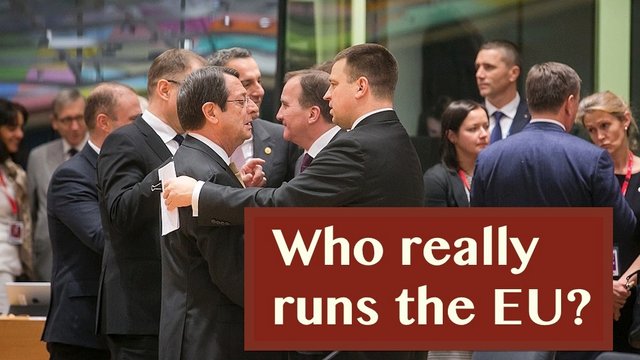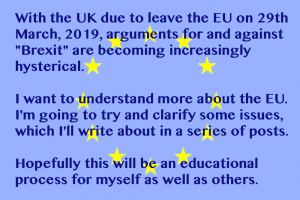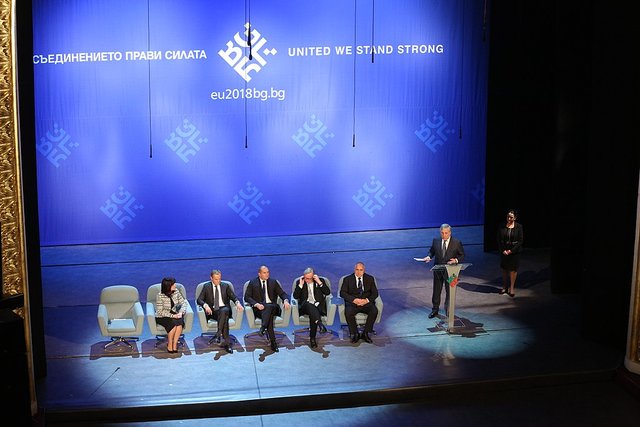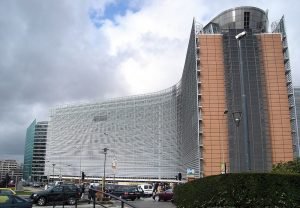Is the EU really governed by unelected bureacrats?

This is one of the charges often levied at the EU. But is there any truth in it?
Yes and no. As with many EU issues, there is no clear-cut answer.

The EU is goverened by four key institutions: The European Council, the Council of the European Union, The European Parliament and the EU Commission. In addition there is the European Court of Justice, the European Central Bank and the European Court of Auditors, as well as various other arms of government.
Only one of these bodies – the European Parliament – is directly elected by voters in member states.
The European Parliament
This assembly is made up of 750 "Members of the European Parliament", or MEPs, plus the President. That number will fall to 705 including the President after Britain leaves the EU.
The European Parliament has legislative, supervisory and budgetary functions. It passes EU laws and makes decisions on international agreements and enlargements to the EU. Although it does not hold the formal power to propose new laws, it can ask the European Commission to do so.
The European Parliament approves the European Commission and elects its President. It has the power to vote a motion of censure, requiring the Commission to resign. The Parliament also establishes and approves EU budgets.
The European Parliament shares legislative and budgetary powers with the Council of the European Union.
Meetings of the European Parliament take place in Strasbourg, France, with committee meetings taking place in Brussels, Belgium. The administrative offices, or General Secretariat, is in Luxembourg.
Each member state elects at least six MEPs, but no more than 96. The numbers of MEPs are allocated according to a system known as degressive proportionality. The total number of MEPs in the European Parliament can be no higher than 751 including the President (705 after Brexit).
The UK has 73 MEPs, roughly one seat for every 865,507 inhabitants.
How do I write to my MEP?
Each political constituency in the UK has an MP (Member of Parliament). With the EU, it's not so simple. Each country is divided into electoral regions, which may have multiple MEPs. The UK is divided into 12 electoral regions, each of which has between 3 and 10 MEPs.
If you have a political concern relating to the EU, it's up to you whether you write to one, several or all of the MEPs who are meant to represent your region. Some of them are much more active in representing their constituents than others.
In the past I have written to all six of my local MEPs and have received replies from two of them.
The MEPs represent different political allegiances, and you might have more hope of a response if your concerns touch on their particular political interests.
If you're a UK citizen and want to write to your MEP(s) but you don't know who s/he/they are, this website should help.
Petitioning the European Parliament
EU citizens and residents can submit petitions to the European Parliament on any subject under the remit of the EU. Companies based in the EU can also submit petitions.
The Council of the European Union
It's easy to confuse the Council of the European Union with the European Council – and to make things even more confusing, there is also the Council of Europe, which is a distinct body from the EU, yet uses the same flag and anthem.
The Council of the European Union (often just referred to as The Council) shares legislative and budgetary roles with the European Parliament, adopting EU laws and co-ordinating EU policies.
The Council does not have fixed membership, but is made up of ministers from each member state whose national portfolio concerns the issue being discussed. The meetings concerning each issue are known as "council configurations", and each of the national ministers represent their government's intrests at these meetings.
The Council of the EU meets in a total of 10 different configurations, and meetings of each of these take place regularly, but with varying frequency. The meetings are held in public when legislative proposals or major issues are being discussed.
The presidency of the Council of the EU rotates on a six-monthly basis, with each member state leading the Council in turn. There are also divisions of 18 months, where three member states work together on a common agenda. These groupings are known as "trios".
The Council's role involves chairing meetings discussing legislation, in co-ordination with the European Commission and Parliament. It works jointly with the European Parliament on the EU budget. It also co-ordinates the policies of member states, develops EU foreign and security policy and concludes international agreements.
The Council of the European Union is based in Brussels.
The European Council
The European Council is a summit of the heads of the 28 EU member states, plus the President (currently Donald Tusk) and the President of the European Commission (currently Jean-Claude Juncker). It defines the EU's direction and priorities, and sets policy, but does not legislate.
The President is elected by the European Council every two and a half years.
The European Council brings together the leaders of EU member states to set the EU's political agenda. It sets out the EU's common foreign and security policy, and nominates and appoints candidates to high-level EU roles, like the European Commission and the European Central Bank.
Meetings take place in Brussels, usually on a quarterly basis.
The European Commission
This is the executive branch of the EU. It operates as a cabinet, made up of 28 commissioners, one for each member state. One of the 28, currently Jean-Claude Juncker, is the Commission President.
The Commission is the sole institution responsible for proposing new laws. It also manages policy, implements the EU budget and ensures that EU law is properly enforced within the member states.
Commissioners are not directly elected, but proposed by the Council of the European Union, on the basis of suggestions made by the relevant member governments. They are then appointed by the European Council after approval from the European Parliament.
Each Commissioner is put in charge of a particular area of policy. This is decided on by the Commission President.
Commissioners have to swear an oath to uphold the interests of the EU rather than their member state. Each commissioner has to submit a declaration of interests.
The current UK representative is Julian King. You can read more about Julian King, and download his declaration of interests at this page.

These are the key governing institutions of the EU. The other key institutions are:
• The Court of Justice of the EU
• The European Central Bank
• The European Court of Auditors
These will be discussed in later posts.

Conclusions?
The only directly elected EU representatives are the Members of the European Parliaments. The European Council and the Council of the European Union are elected representatives of member states.
The European Commission is unelected, and it's probably this institution above all that incites many of the accusations of "unelected bureaucrats". The Commission has been at the centre of lobbying controversy and corruption scandals.
Although I have only had space here to take a brief overview of these governing bodies, there are other aspects that can cause concern. For example, the Council of the European Union is made up of ministers from each member state, but there are hundreds of civil servants in permanent positions working in the background, on a body called Coreper. This body is also assisted by working groups.
Although there is nothing inherently wrong with this, it can add to the feeling that EU policy is confusing, lacking in transparency and being made by "faceless bureaucrats".
The other issue is that most MEPs have a very low profile compared to other types of politician. This may be mainly due to media coverage, but I think it's also due to lack of communication from the MEPs themselves. I know of one MEP who is a very strong communicator, but this is unusual in the UK at least. The MEPs with the biggest public profile tend to be the ones who are campaigning against the EU.

Sources:
https://europa.eu/european-union/about-eu/institutions-bodies_en
https://en.wikipedia.org/wiki/Institutions_of_the_European_Union
https://www.consilium.europa.eu/en/
https://www.gov.uk/world/organisations/uk-representation-to-the-eu
https://www.economist.com/europe/1998/08/06/coreper-europes-managing-board

Main photo source

Previous posts in this series:
Trying to make sense of the EU

Posted from my blog with SteemPress : http://democracyisntworking.co.uk/eu/is-the-eu-really-governed-by-unelected-bureacrats/




Congratulations @enquiringmind! You have completed the following achievement on the Steem blockchain and have been rewarded with new badge(s) :
Click here to view your Board
If you no longer want to receive notifications, reply to this comment with the word
STOPCongratulations @enquiringmind! You received a personal award!
You can view your badges on your Steem Board and compare to others on the Steem Ranking
Do not miss the last post from @steemitboard:
Vote for @Steemitboard as a witness to get one more award and increased upvotes!